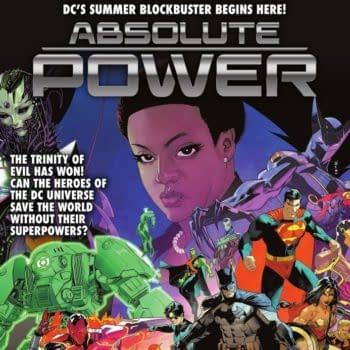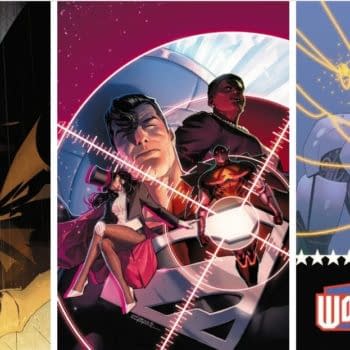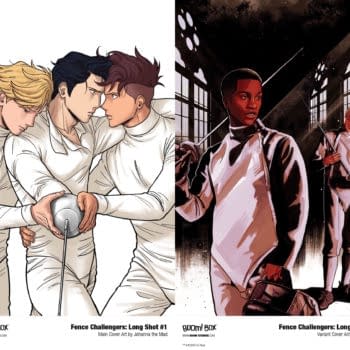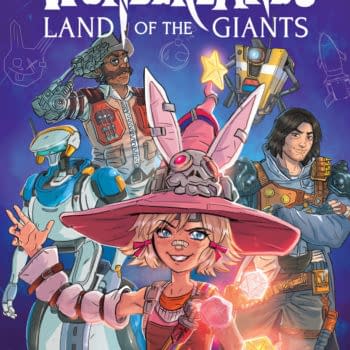Posted in: Comics | Tagged: Comics, nightmare world
Sandwiches vs. Comics – Write Or Wrong #73 by Dirk Manning
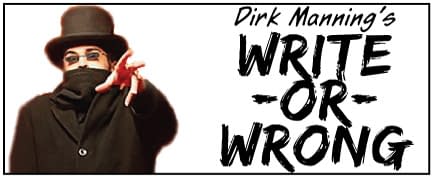
In the next few weeks I'll be appearing at The Appleseed Comic Con in Fort Wayne, Indiana (Saturday, May 11th) and then making my sure-to-be-historic debut at Motor City Comic Con in Novi, Michigan (May 17th to May 19th), and as an added bonus I'll be doing live Write or Wrong panels(!!!) at both shows! If you're into that sort of thing be sure to swing by and visit for a bit. I'm really a nice guy, despite what the avatar of me wearing a top hat, sunglasses and scarf may lead you to believe.
That aside, let's talk about creating comics.
When I was in high school I took typing classes on a typewriter.
Now, lest you youngsters out there think I'm some sort of fossil of a human being, let me tell you that I haven't even hit my fortieth birthday yet.
To be fair, by my junior year I could have taken "Computers I" instead (yes, that's what the class was called), but I guffawed at the idea. After all, I wasn't going to grow up and be a scientist or something, you know?
Typewriters, though? Those, I reasoned with myself, would be around forever.
Mind you, it's not that I had never seen a computer before, as I was first exposed to them as something more than a machine I could use to play Oregon Trail and Bouncing Babies in 8th Grade when my computer class teacher enthusiastically taught the class how to make an "infinite loop" of repeating green text across the black screen.
My text loop read "This is boring…", and thus began and ended my enthusiasm for computers for many years to come.
Well, except for the two aforementioned games, of course.
Admittedly, being a teenager from a low-income family who had somehow been snuck into an affluent school district gave me a certain chip on my shoulder, and as a result I viewed computers in general as a flash-in-the-pan fad for rich kids (at best) or a luxurious symbol of excess I didn't see myself ever owning (at worst).
Add to that how, as I alluded to a moment ago, I was born at just the right (read: wrong) time – the very tail end of the pre-computer generation – and the end result was a disaffected youth who simply saw no need for learning about computers.
By the time I hit college the "buzz" was that each and every student would "eventually" have their own personal computers with them at all times, and I even specifically remember watching a promotional video produced by George Lucas and Stephen Spielberg in which they showed a future comprised of real-time video chats on small tablet-like devices, voice-activated appliances and more.
It was around 1994, I believe, and the idea struck me and most of my peers as more science-fiction than imminent-future. College-wide email and Usenet were only just starting to really take off (as I saw it, at least), and the idea of a future – in my lifetime – where everyone would be carrying computers around latched to their belts struck me as science fiction or – worse yet – delusional.
Heck, by the time I even managed to afford a home "computer," it was little more than a typewriter with a screen, and even the computers in the journalism office for the college newspaper were CRT machines that ran ClarisWorks as a word processing program.
(We would then print large sheets of paper and assemble the paper each night by literally cutting and pasting it.)
Considering all of this, the fact that I'm now typing this very column on a laptop computer and saving my progress on a thumb-sized disk-drive that can hold more material than my old PowerMac 6500 (my first "real" computer) could even dream of handling still continues to fill me with awe every single day.
As does Skype.
And cell phones that don't need external antennas.
And RSS feeds, whatever they are.
And social networking sites. Especially social networking sites.
Now, as an adult (who still on occasion carries that same teenage chip on my shoulder), I find that I have a borderline religious fascination with the power and potential that computers can offer all of us – but especially comic creators (and artists and musicians) – in regard to creating, promoting and distributing their work using tools such as social media outlets.
I realize that these days it's hard for most people to imagine living in a world without social media outlets, but – and yes, I'm waving my "faux old man" card here – I "came up" through the ranks as a comic creator during the rise of the Internet Message Boards, a cyber-social avenue that becoming more and more archaic even as I type this.
(In fact, just a few months ago at a convention, a young man brought me a copy of Write or Wrong: A Writer's Guide to Creating Comics to sign – which, if you haven't procured your own copy of yet, is available right here – only to then ask what these "Message Boards" were that I touched on briefly in one of the early chapters. Totally straight-faced, he asked me "Are those the places people used to hang out online before Facebook and Twitter?")
*le sigh*
Back in the early to mid-2000's, when I first launched Nightmare World, I was able to use Message Boards to spread the word about my then-fledgling online comic series with a pretty fair amount of success. They key was not being "Spammy" about it, simply keeping my posts about the comic's weekly updates limited to one thread. Message Board regulars would sooner or later decide to open the thread where I posted and click the link to see just exactly what I was posting about every week, with the end result being many of those people becoming regular readers of the series.
All these years later, this series Nightmare World is still available to read for free online right here.
(Subtlety, for all of its supposed merits, has never been one of my greater strengths.)
While online blogging/networking sites such as LiveJournal were also around at this time (Friendster, anyone?), these sites didn't really appeal to me in regard to my main goal of maintaining an recognizable online presence. I was mainly interested in using online avenues to expose people to my comic book work (obviously), especially as it only existed online and I didn't have a budget (let along physical copies of the work to distribute/sell) for the convention circuit.
Then MySpace launched, and finally the avenue existed that would become a real game-changer for me, the then-up-and-coming comic book professional.
Within mere months I was able to expose thousands of new people to my work just by posting about it in certain online groups and my "meeting" like-minded fans of horror and/or comics – again, all without begging or being "Spammy." After all, if you were online when MySpace when in its prime, you always had an extra window open that was dedicated specifically to checking MySpace.
True story, bro.
The real "glory" of MySpace – aside from its insane popularity for a while there – was that it was the first mainstream opportunity that non-tech-savvy folk (such as myself) had to create not only our own websites, but our own online identities and brands.
Sure, sure… the same things could be done via message boards and LiveJournal and the like… but not nearly to the extent – nor with so much freedom, flashiness, and sheer pizazz – as the original version of MySpace allowed.
Although we (or at least I) didn't recognize it at the time, the dawn of "online social networking" was upon us. With the creation of MySpace, anyone who created an account could have their own little slice of Internet real estate to call their own, no knowledge of HTML coding – or financial investment – required.
While a majority of MySpacers used the site as a place to post blogs and make online booty-calls (it's OK to admit it – we're all friends here), it was bands who profited (literally) the most from MySpace, using their respective pages as an online hub where they could both host and promote their work (their music) in a real-time fashion – for free!
Given that I still had my toe in the pond of music journalism at this point (even if I was not longer an active music journalist, instead turning my attention to my comics career), I can tell you with authority that hundreds of savvy and forward-thinking bands out there were able to take their game to the next level (by drastically increasing their exposure for the concert circuit, selling more albums, getting signed by major labels, or some combination thereof) just by effectively using their MySpace pages to engage with fans/listeners while keeping a focus on their work.
Which, really, is what any of you aspiring and/or up-and-coming comic creators out there should be doing with your social network pages such as Facebook and Twitter – rather than posting pictures about sandwiches you're about to eat and complaining about your day jobs.
Because here's the thing, folks: Unless you're uber-famous – which 99.99% of you out there (myself included) are not – the only one who really thinks those type of blasé musings are even mildly noteworthy is most likely you.
Honestly, my friends: Take a step back from the faux-online "celebrity" status having your own Facebook page or Twitter feed grants you and ask yourself this question, for starters:
Do you really think that most people really care about that sandwich you just ate or that you just had to, like, totally deal with, like, the worst customer ever?
With the possible exception of your closest and best-est friends – most people don't.
And yes, I'm saying this regardless of how many "Likes" the most recent picture of your totally stellar Reuben sandwich got the other day, or how many "Re-Tweets" your pithy insight about that last customer who was such an ass-hat, lulz.
Mind you, I'm not trying to be paternal here and tell you how to run your social networking sites, but rather expose you to the observations of a guy who not only "grew-up" without such wonderful promotional and brand-building tools at his disposal, but now sees so many aspiring and up-and-coming comic book professionals frustrated because they (and/or their work) are not getting the recognition they feel they've earned.
To that end, I encourage you, folks: Be a bit more "calculating" about how you use your social media.
In this day and age, you have access to free social networking/media promotion tools the likes of which has never before been available with such ease, efficiency, and appeal in all of human history to date.
Considering this, should you – the guy or girl who wants to build and establish brand awareness for yourself and your comic work – really be using it to complain about traffic and the weather?
REALLY?</>
Again, I realize I may be in a unique position regarding my view of technology here due to the reasons and experiences I described at the beginning of this column… but seriously, folks: If you're an aspiring comic book professional, you really should be treating your social media networks as more of an opportunity to establish your brand and create exposure to your work than you should as your own little place to shine a light on the mundane nuances of your day-to-day existence.
If you want people to know and recognize you as a comic book creator, then that's how you should use social media to market yourself.
That being said, don't get me wrong about how you can (and should) use your social media feeds to mix-in a little "fun" with your business, too.
After all, as anyone who'd connected with me via Facebook or Twittercan tell you, I love to share funny, inspirational and or thought-provoking memes as much as – if not even more than – anyone else (something regular Bleeding Cool readers may remember as causing quite a stir across the Internet several months back).
However, even actions like this – helpful or harmful – are a reflection of my personal and professional tastes and, by extension (again, for better or for worse) my image and brand as a creator and a professional.
(Regardless of what any of you may think about the meme I shared that caused such a stir – or my reasons for sharing it – you'd be hard-pressed to say that, even when confronted with some pretty volatile backlash (including the lobbing of "F-bombs" by some people who – professionally speaking – should know and act better), I handled myself in anything less than a courteous and professional manner. This, as far as I'm concerned, says at least just as much about me as a professional as the "controversy" surrounding the meme itself that spawned all the cyber-drama.)
(And if you have no idea what I'm talking about here, don't worry about it. I'm sure it's something I'll eventually get to at some point in this column when it's appropriate to discuss it… but that time is not now.)
Point being, my friends, just because you can take and post pictures of yourself in the bathroom – or in your car – or at work – or lying in bed – doesn't mean you should… especially if you want to stand out from (and I dare say rise above) the other 99.99% of Facebook and Twitter users who are using their pages mainly to do just that.
Do I chill on the couch sometimes? Occasionally.
Do I sometimes get stuck in traffic? Yeah.
Do I have bad days here and there? Of course.
We all do, folks.
What I don't do, though – and what I encourage you not to do – is talk/post/Tweet about those types of mundane situations via social media.
Rather than using your social media tools/outlets as a platform to talk about you-you-you, I would recommend that you instead promote your comics… or if you're not there (yet, at least), then focus on a grander scale, your brand.
For example, when each of you think of "Dirk Manning," I want you to think of that guy with the funny publicity photo of the guy with the hat, scarf and glasses who writes the Write or Wrong column (and now book series) as well as the comics Nightmare World, Tales of Mr. Rhee and Love Stories About Death among others.
When you see my name or "avatar" flash across your feed on Twitter or Facebook I want you to think "Oh, that's the guy who has written some really cool short films for BlackBox TV and is now hosting that new monthly podcast called Monsters and Metal – and he's a pretty interesting guy who posts pretty interesting things! I wonder what's going on with him today?" rather than glossing right past my updates, postings and Tweets due to the fact that I only use these platforms as a glorified vanity press.
Tweet that your comic updated.
Post about an interesting article you read.
Share pictures of things you like that your "audience" will like.
Be funny. Be interesting. Be thought-provoking.
DO EVERYTHING YOU CAN TO GET PEOPLE INVESTED IN YOUR WORK AND YOUR BRAND."
Actions speak louder than words, my friends… and if you primarily take the time and effort to post about mundane things, well, what's that say about you?
Food for thought… unlike those worthless sandwich pictures so many people are posting online these days.
***
QUESTION: By your estimation, which creators/public figures have the most interesting, informing and/or entertaining Facebook/Twitter feeds? Discuss in the comments section below.
IN TWO WEEKS: : Write or Wrong #74: "Pretty Hate Machine"
Dirk Manning is the writer/creator of the Nightmare World trilogy of graphic novels (from Image Comics/Shadowline – all available to order from your local comic shop) and Write or Wrong: A Writer's Guide to Creating Comics (from Transfuzion Publishing – available exclusively from Amazon.com). He is also the writer/creator of the online comic series Tales of Mr. Rhee and Love Stories About Death (both of which are available to read at online for free at www.ShadowlineOnline.com). Along with the aforementioned comic-related work, he has also written several short films for BlackBox TV and has some other cool stuff in the works that he can't talk about yet. (Damn contracts.) Dirk lives on the Internet and can usually be found lurking around Facebook, Twitter and even his own website www.DirkManning.com on a fairly regular basis… when he's not busy writing, of course. Feel free to follow him at one or all such locations if you're into that sort of thing. Cthulhu is his homeboy.






